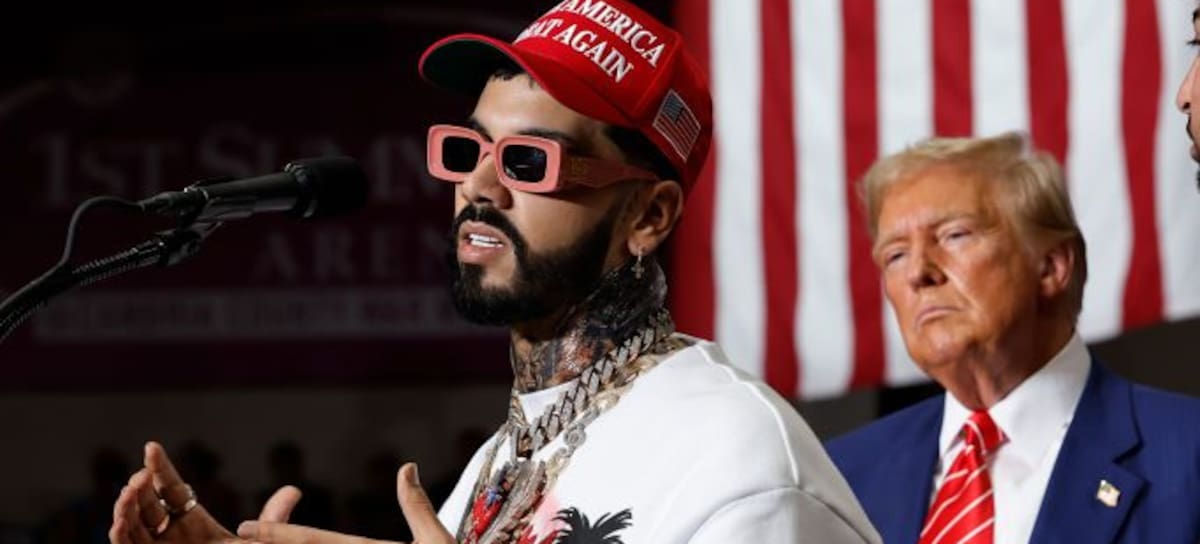Why Is Anuel AA Supporting Trump? Impact and Measures for the Latino Community
The Puerto Rican artist appeared at Trump's rally in Pennsylvania

JOHNSTOWN, PENNSYLVANIA - AUGUST 30: Puerto Rican rapper Anuel AA (L) joins Republican presidential nominee, former U.S. President Donald Trump during a campaign rally in the 1st Summit Arena at the Cambria County War Memorial on August 30, 2024 in Johnstown, Pennsylvania. Promising to cut energy bills in half, conduct the largest deportation operation in history and put a 200% tariff on foreign made automobiles, Trump rallied his supporters in the all-important battleground state of Pennsylvania. (Photo by Chip Somodevilla/Getty Images)
In a surprising and controversial turn, Puerto Rican reggaeton artist Anuel AA has publicly expressed his support for former U.S. President Donald Trump. This endorsement has caused quite a stir within both the Latino community and the music world. Below, we explore the reasons behind this decision and the recent encounters that have solidified this alliance.
On August 30, 2024, Anuel AA, along with fellow artist Justin Quiles, appeared at a Donald Trump campaign rally in Pennsylvania. During the event, Anuel AA not only showed his support but also delivered a speech praising Trump’s qualities as a leader. “We all know that the greatest president the world has ever seen, the greatest president this country has ever seen, is President Trump,” Anuel AA said. His statement was met with applause and cheers from the rally attendees.
Additionally, Anuel AA visited Trump at his residence, accompanied by his wife and father. During the visit, the singer shared several photos on his social media accounts, urging his followers to vote for Trump in the upcoming November elections. “Everyone needs to vote for Donald Trump. My Latino and Hispanic brothers, let’s stay united as the family we are and vote for the good and safety of our country, which is our home,” Anuel AA wrote on Instagram.
Anuel AA’s support for Trump stems from several factors. First, the singer has expressed dissatisfaction with the current administration under Joe Biden, whom he accuses of making empty promises. “Biden kept promising, promising. Many politicians have made promises over the years,” Anuel AA said during his speech at the rally. In contrast, the reggaeton artist sees Trump as a strong and decisive leader, capable of improving the economy and creating more opportunities for everyone.
Another important factor is Anuel AA’s desire to see Puerto Rico thrive. During the rally, he said that Trump wants to help the island grow and succeed. “He wants to continue helping Latinos in the United States,” he added. This stance has been particularly controversial, given Trump’s history with Puerto Rico, especially following Hurricane Maria in 2017.
Anuel AA’s support for Trump has not been without criticism. Many Puerto Ricans and Latinos have expressed surprise and discontent, recalling how Puerto Rico was treated during Trump’s presidency. In 2017, after Hurricane Maria, Trump was criticized for downplaying the severity of the disaster and for his delayed and inadequate response.
Despite the backlash, Anuel AA has remained steadfast in his support. In his statements, he has emphasized the importance of having a president who protects the country and improves the economy. “We need a strong president who can protect us from any threat and boost the economy, creating more opportunities for all of us and for the future and well-being of our children,” he said.
Anuel AA’s endorsement of Donald Trump reflects the complexity and diversity of opinions within the Latino community. While some see Trump as a leader capable of bringing positive changes, others remember his policies and track record with bitterness. What is clear is that this alliance has placed Anuel AA at the center of a political and social debate that transcends borders and musical genres.
Trump’s Measures Against the Latino Community
During his presidency and current campaign, Donald Trump has implemented and proposed several measures perceived as xenophobic toward Latinos. One of the most controversial policies of his administration was the separation of families at the U.S.-Mexico border. This policy, implemented in 2018, resulted in the separation of thousands of children from their parents, many of whom were asylum seekers from Latin America. The measure sparked widespread outrage and was widely condemned both nationally and internationally.
Trump also introduced multiple restrictions to the asylum process. His insistence on building a wall along the U.S.-Mexico border was seen as both a symbolic and practical measure to curb Latino immigration. While not all of the wall was completed, the rhetoric and efforts to fund and construct it were constant throughout his presidency. This initiative was accompanied by harsh rhetoric against Latino immigrants. During his 2016 campaign, Trump referred to Mexican immigrants as «rapists» and «criminals,» and this rhetoric continued during his presidency, fueling anti-immigrant and xenophobic sentiments.
In 2019, Trump threatened to impose tariffs on all Mexican products if the Mexican government did not take stronger measures to stop the flow of migrants to the U.S. This was seen as economic pressure to control Latino immigration. Additionally, Trump sought to end the Deferred Action for Childhood Arrivals (DACA) program, which protected young undocumented immigrants, known as «Dreamers,» from deportation and allowed them to work and study in the U.S.
Even after his presidency, Trump has continued to make controversial statements about immigrants. In December 2023, he claimed that migrants were «poisoning the blood» of the U.S., a statement widely condemned and compared to fascist rhetoric. In his current presidential campaign, Trump has promised to reinstate many of his previous immigration policies and has continued to use harsh language against Latino immigrants.
These policies and statements have generated significant controversy and are seen by many as direct attacks on the Latino community in the U.S. The perception of xenophobia in Trump’s policies and rhetoric has been a recurring and divisive issue, both during his presidency and in his current campaign.
Ana Rojas
Periodista en LOS40, coordinando LOS40 USA y colaborando también en El País. Cubro temas de música,...
